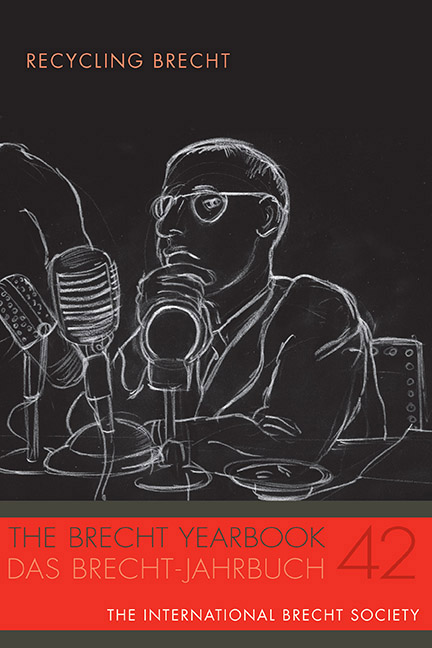The Castrated Schoolmaster: Brecht, The Tutor, and Lenz
Published online by Cambridge University Press: 09 April 2021
Summary
Brecht's Theater of Cruelty
“That was cruel theater, an intrusion into consciousness, an attack on false consciousness, the destruction of illusions,” claimed Heiner Müller and added that this production was the “high point” of the work at Brecht's Berliner Ensemble. The Tutor was a lesson on how to make theater like Brecht. However, if Brecht's work in the theater, as the postwar legend in the second half of the twentieth century would have it, now peaked in the founding of the Berliner Ensemble and if The Tutor at the Berliner Ensemble comprised the culmination of that which was possible, then it makes sense to take a look at this piece today from a theater studies perspective. While numerous essays and a whole book have been written on The Tutor from a literary or socio-historical perspective—a theater studies perspective is still to be developed. After a short recapitulation of that which Brecht attempted with his adaptation of Lenz's play, in an attempt to rehabilitate this notable piece from a theater studies perspective, I would like to examine three aspects: to which extent this production was part of Brecht's professed project of creating a theater for the “scientific generation of scandals” or of “ideology demolition.” Furthermore, I will attempt to follow the specificity of his work in the theater, and finally, I would like to trace the way that Brecht elevated the castration scene to the status of an emblem, before ultimately arriving at a new interpretive hypothesis by going over previous interpretations of this scene.
Brecht's Adaptation of the Historical Material
In The Tutor or the Advantages of Private Education, Jakob Michael Reinhold Lenz picks up on a grievance of his time: because the gentry obstructed their appointments as pastors, young theology graduates—like the protagonist Läuffer in Lenz's play—must hire themselves out as servants to earn a living, are exploited as “tutors,” which means as private teachers dependent on the favor of aristocratic patrons. Läuffer teaches in Insterburg in the service of a major, his precious wife, and their children Leopold and Gustchen. A parallel plot shows how Gustchen's lover Fritz spends his student life in faraway Halle together with other high society sons.
- Type
- Chapter
- Information
- The Brecht Yearbook / Das Brecht-Jahrbuch 42Recycling Brecht, pp. 67 - 84Publisher: Boydell & BrewerPrint publication year: 2018

